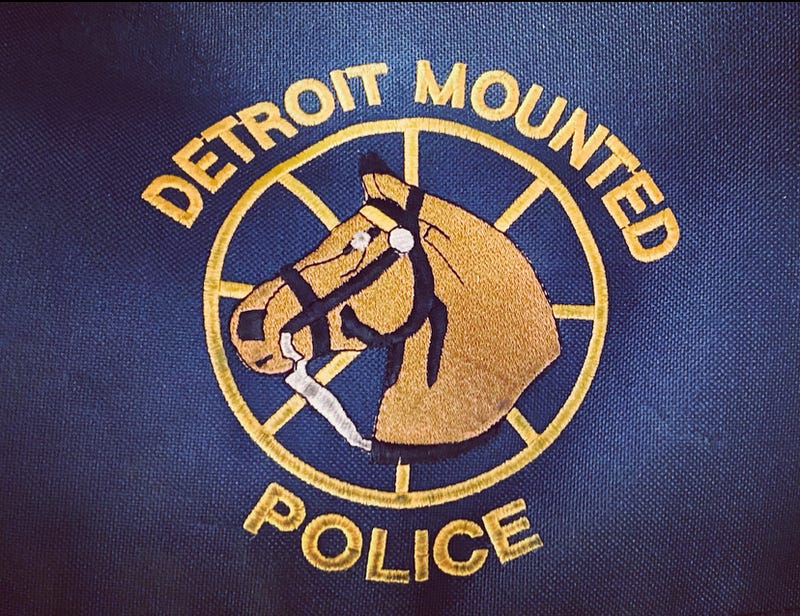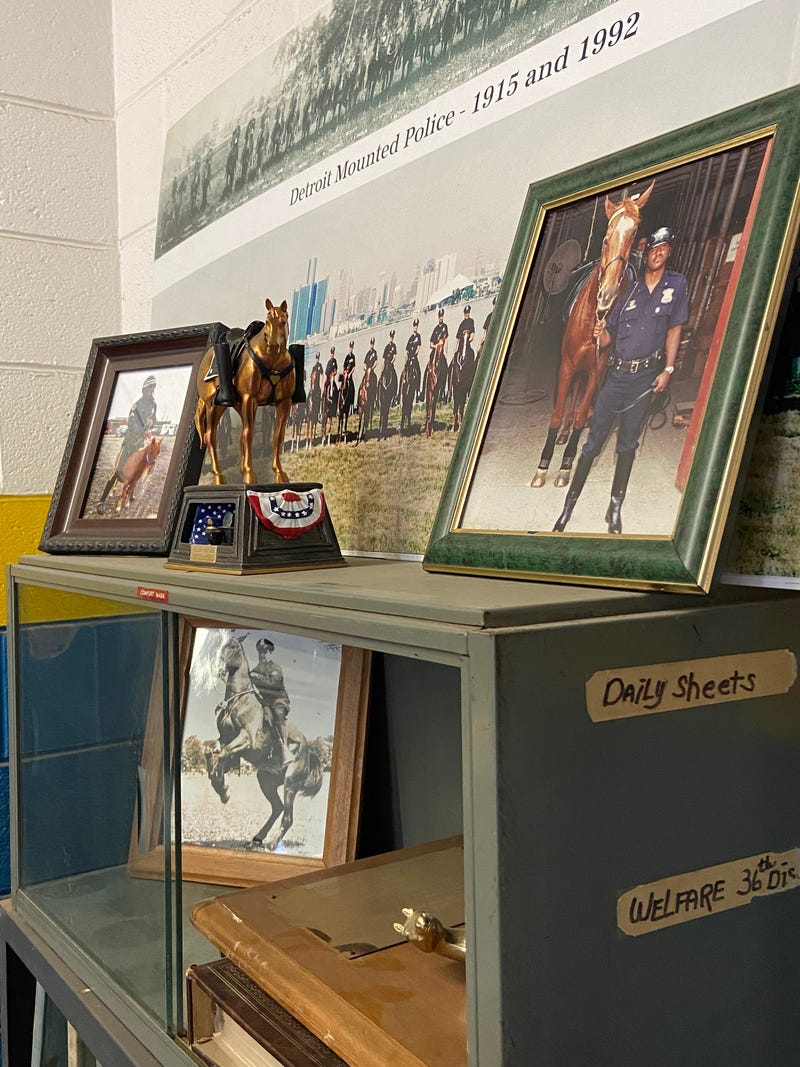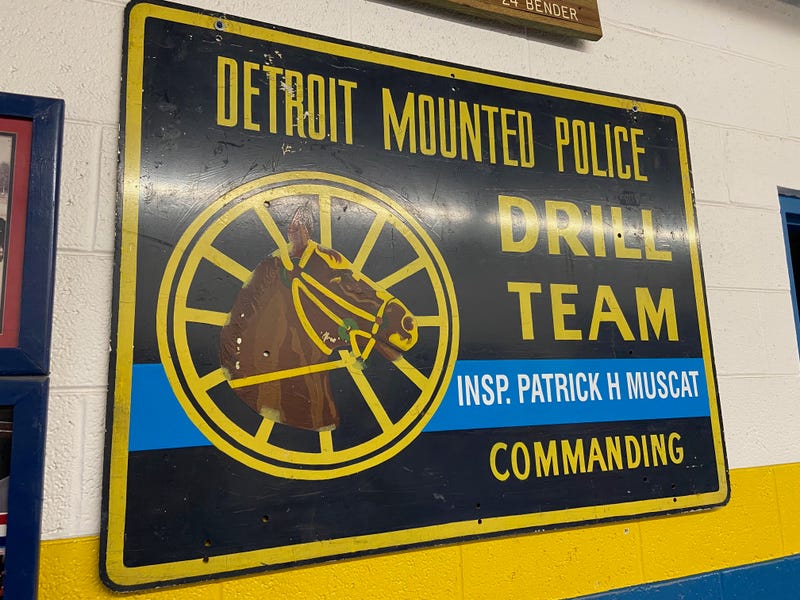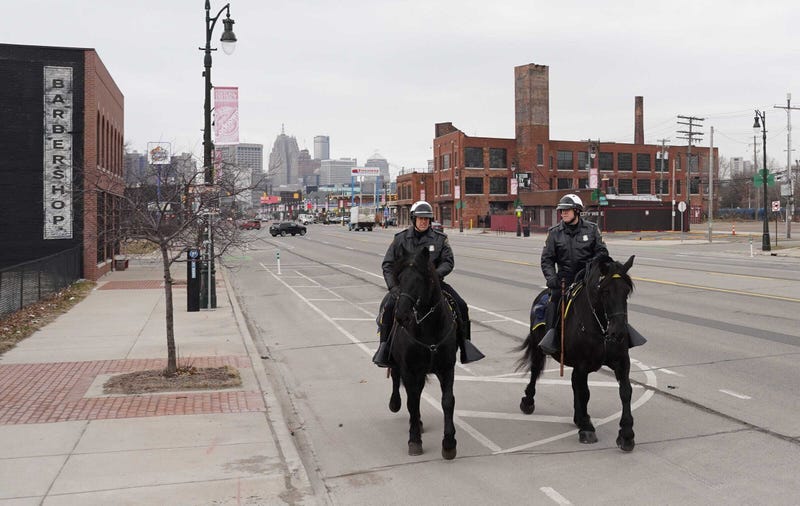
DETROIT (WWJ) -- Horsepower in Detroit has long been synonymous with Ford’s crowning achievement: The Mustang. But the sheer power, style and grit of one of the world’s most famous muscle cars came more than a century after the first driving force was established in the Motor City.
Enter the Detroit Mounted Police: a driving force where each member weighs between 1,500 and 2,000 lbs. of muscle and girth, providing the real movement behind one of the oldest mounted law enforcement units in the country.
The department has a storied history that began in 1893, only a few years before Henry Ford built his very first automobile a few blocks down the street.
From there, the department grew, hitting its peak in the 1970s with a force of 80 officers and over 60 horses maintained in five barns across the city.
The unit was a part of every major event within Detroit, participating in presidential visits, sporting events, parades and festivals.
Operations and patrols overseen by mounted police and their equine partners ran continuously for 112 years before then-Mayor Kwame Kilpatrick disbanded the unit in 2005 over budget concerns.
The unit faced four years of inactivity until Mayor Dave Bing, along with strenuous efforts by Motor City Horse Force, Restore the Horse and the Detroit Public Safety Foundation reinstated Detroit's mounted police in 2009.

The department moved to its current location in historic Palmer Park on Detroit's north side in 2010, determined to rebuild and acquire horses to keep up the traditions established by other officers 117 years prior — and that hard work as paid off.
The unit occupies a large building half-hidden by trees and easily overlooked if one wasn't searching for it. In between the woods, the wind carries the soft sound of munching and nickering with the faint smell of manure, leather and wood shavings.
All things quintessentially horse greet the senses as Detroit Mounted Police officers Sandra Chavez and Phil Long lead the force's biggest horses, twin bay Clydesdales named Winston and Whiskey, into the barn.
"These two are what people say 'Gentle Giants'," Chavez said to WWJ's Cassandra Llamas-Fossen between the clip-clop of horse hooves. "These two are very gentle. They are very calm. They've got great personalities, great demeanors, great dispositions."
"They came like that, too," Long said. "We were very fortunate with that."
In addition to Winston and Whiskey, the unit consists of eight other similar sized and tempered horses named Mirah, Rusty, Jackson, Bob, Remi, Ivan, Capone and Baby.
"We try to stick with Draft [horses] because they are working horses," explained Chavez as Winston towers next to her at 17.2 hands, or 70 inches high at the withers. "So it's much better for them and for us; they're used to the work."
Chavez, a 24-year-veteran of the Detroit Police Department, said the Clydesdales are half-brothers bred by the popular beer company, Budweiser, and later rejected for not meeting the company's tough equine standards.
Their paths ended up in Detroit where the two horses passed the department's requirements and training with flying colors. Chavez said all horses are subjected to a 30 to 90 day trial to see if they can handle common patrol and parade situations and are desensitized to a variety of noises and people they would encounter.

"[We] want to see if the horses are going to be okay with city traffic, loud noises, vehicles, motorcycles, just a lot of attention from people," Chavez said.
The force's horses come from a wide range of backgrounds and not all who go through training pass the requirements to become a Detroit Mounted Police horse.
"Some horses don't leave their yards or arenas, so it's a big change for them to go from a farm to a big city like Detroit," Chavez said.
Outside, the other horses snack on hay and rest before getting ready for the day's assignments. The officers are each paired with a horse and are responsible for grooming, feeding and looking after their four-legged partner on a daily basis.

The horses work or train every day and aren't only reserved for parades and festivals. The department routinely patrols Midtown, Wayne State, Greektown, Corktown and attend a number of career days at local schools.
Chavez said having the horses out in public has helped bridge the community with the Detroit Police Department and establish good relationships with neighborhoods and residents within the city.
"Everyone might not want to see a police officer, but people can't resist seeing the horses," Chavez said. "These guys make a huge difference for us with interacting with the public. You know, you can see a kid's face 50 yards away, smiling and beaming and it's like, 'Oh, we got to go over there. We got to go see them.' And they love being able to pet the horses take pictures with the horses."
The horses certainly do their part to warm the hearts of everyone they encounter. Chavez said the animals let their personalities out and love the interaction with people; one is known to stick his tongue out and smile at those who come up to him while another horse is infamous for taking people's phones and jewelry right out of their hands.
The horses are so popular, Chavez has started their own TikTok page which has over 17,000 followers.
"Although I like to show off my horse [Mirah] which is a Percheron-Thoroughbred...[followers] asked for the Clydesdales," Chavez said. "They asked for the big guys and I try to show everybody. I saw other people posting about their horses and I thought I want to do this too let me show our beautiful horses."
The public is also welcome to visit the barn to see the horses in-person. Chavez said people can call ahead of time to make sure an officer is available to give a tour and the only fee is an apple or a carrot for each of the equine officers.
The unit is solely dependent on private funds and donations from Detroit Public Safety Foundation and the Downtown Detroit Partnership; the department offers a sponsorship opportunity for the public to 'adopt' one of the horses for a certain period of time for a tax-deductible donation.
For a day: $20
For a month: $600
For a year: $7,500
The department said the fees go towards the horses feed, bedding, vaccinations, vet work, vitamins, farrier work, shoes, grooming and bathing supplies, and other necessities.
Chavez and the team of officers look forward to continuing the 129-year-old history and tradition of the Detroit Mounted Police and are working to expand on the facility; it is their hope to bring more horses to the unit in the future.
"At our highest we had 60 and 80 horses back in the day; I can't see us getting quite back to 60, but maybe 14 to 20 would be nice."
